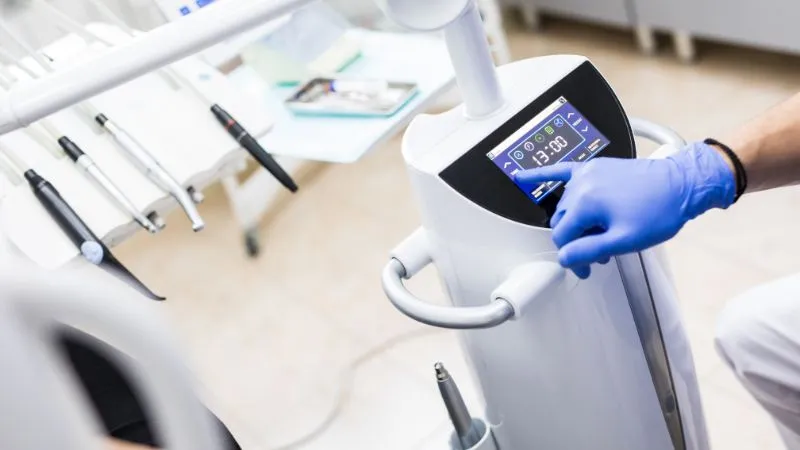A person’s smile is frequently the first thing that others notice about them. Most people who have green teeth immediately consider before and after dental implants or dental plates. Except for this method, teeth whitening equipment provides a practical remedy to improve the look of teeth and raise self-esteem. In this post, we’ll examine the working, advantages, and precautions of teeth-whitening devices.
The Science of Whitening Teeth
It’s critical to understand the science of tooth yellowing before diving into whitening technology. Teeth can become discolored or stained for several reasons, including:
Extrinsic Stains
These are surface-level stains brought on by consuming foods and drinks such as coffee, tea, red wine, and some fruits. Another frequent contributor to extrinsic stains is tobacco usage.
Intrinsic Stains
These stains, which form beneath the enamel’s surface are due to aging, trauma, exposure to specific drugs in the developing stage, and excessive fluoride use. Although some can also partially lighten intrinsic stains, whitening equipment generally targets external stains.
The Power of Teeth Whitening Machines
The use of a whitening agent, typically in the form of a gel, and the employment of particular technology to speed up the whitening process are the two main components of modern teeth-whitening equipment. Compared to conventional procedures, these machines offer the following benefits:
Efficiency
Teeth equipment speeds up the whitening process and frequently shows after just one session. The use of specialized light sources, such as LED or halogen lamps, which activate the whitening gel and help remove stains, is responsible for this effectiveness.
Consistency
Teeth whitening machines, as opposed to at-home whitening kits, consistently and carefully apply the whitening ingredient, guaranteeing even coverage and more predictable outcomes.
Customization
Professional-grade teeth-whitening equipment enables customized treatments based on the demands of the individual. To get the desired level of whitening, the treatment’s duration and intensity can change with time.
Safety
You can overcome the risk of overexposure to the whitening chemicals with these machines, which can cause sensitivity and gum irritation.
What Are The Precautions Before Whitening Teeth?
The following things should do before having professional teeth whitening:
Consultation
If you want to know that this method is right for you, talk to a dentist. They can determine what kind of stains you have and suggest the best course of action.
Teeth Health
Healthy teeth respond well to whitening. Before whitening, take care of any cavities, gum disease, or other dental problems.
Sensitivity
Some people may experience brief sensitivity after whitening their teeth. Before continuing, talk to your dentist if you have a history of sensitive teeth.
Expectations
Even though tooth whitening can dramatically lighten the color of your teeth, some people, particularly those with deep intrinsic stains, may not achieve a completely white tone.
Is it a safe method for teeth whitening?
When done by some professionals, It is typically safe. Although it is a common cosmetic operation, not all techniques are equally safe or suitable for all people. Here are some crucial considerations in relation to the security of teeth:
Professional Experience
A competent dental professional will whiten your teeth, which considerably lowers the chance of issues. Dentists may evaluate the condition of your teeth and gums, and suggest the best whitening technique.
Suitability
It is not appropriate for everyone. If you do it without first taking care of gum disease, cavities, or tooth sensitivity, the patient may feel discomfort or increased symptoms.
Professional Treatment vs. Over-the-Counter Medicine
Products for it are available over the counter, like whitening toothpaste, strips, and gels. Professional teeth whitening procedures are typically more successful and controlled.
Sensitivity
An ordinary adverse effect of tooth whitening is brief tooth sensitivity. Although it normally goes away after the procedure, anyone with a history of dental sensitivity should let their dentist know before starting.
Irritation on Gums
Gum irritation is due to improperly fitted whitening trays or overuse of whitening chemicals. The professionals know only to correct the use of the whitening agents without overexposing the gums.
Intrinsic Stains
Deep-seated intrinsic stains brought on by ailments, trauma, or an excessive amount of fluoride exposure may not be as responsive to whitening procedures. Alternative cosmetic dental procedures might be more suitable in these circumstances.
Natural Dental Architecture
Treatments for whitening concentrate on bringing out the natural color of the teeth. Your crowns, veneers, or fillings will remain safe by the whitening procedure.
Longevity
The effects of whitening of teeth are temporary and may deteriorate with time, particularly if you continue to consume stains like coffee, tea, or cigarettes. To keep the correct shade, maintenance and sporadic touch-up treatments could be required.
Conclusion
Teeth whitening machines have completely changed how we think about dental aesthetics. They provide a route to a smile with more self-assurance because of their quick and efficient stain-removal capabilities. However, it’s crucial to approach whitening under the direction of dental experts and with reasonable expectations. While a radiant smile may surely make an impression, maintaining good oral health should always come first.
FAQ’s
How long does teeth whitening take?
In-office treatments can take about an hour, while at-home treatments require several days to a few weeks.
Will teeth whitening make my teeth unnaturally white?
It can enhance your natural tooth color, not create an unnaturally bright shade.
If I have dental restorations, can I still whiten my teeth?
It primarily affects natural tooth structure. Dental restorations like crowns and veneers will not whiten in the same way.
Do teeth whitening work on all types of stains?
It is most effective on extrinsic stains.

